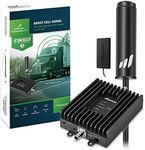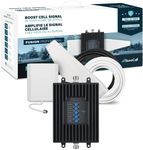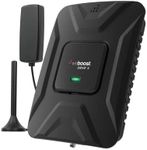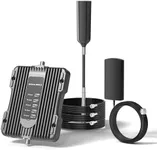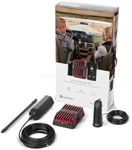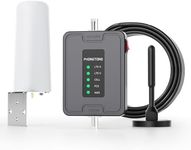Buying Guide for the Best Vehicle Cell Signal Boosters
Choosing a vehicle cell signal booster can make a big difference in your ability to stay connected while on the road, especially in areas with weak cellular coverage. The right booster will help you get clearer calls, faster data, and fewer dropped connections. To find the best fit, it's important to understand the main features and how they relate to your specific needs, such as the type of vehicle you drive, the number of users, and the areas where you travel most often.Supported Frequency BandsSupported frequency bands refer to the range of cellular frequencies that the booster can amplify. This is important because different carriers use different bands for their networks, and not all boosters support every band. Some boosters cover only a few bands, which might limit compatibility with certain carriers or newer network technologies. Others support a wide range of bands, making them more versatile. If you want to ensure your booster works with your carrier and supports both voice and data, check which bands your carrier uses and match them with the booster’s specifications.
Coverage AreaCoverage area describes how much space inside your vehicle the booster can effectively cover with improved signal. Some boosters are designed for small cars and only cover a few feet, while others can cover larger vehicles like RVs or trucks, reaching all passengers. If you usually travel alone or with one passenger, a smaller coverage area may be enough. For families or groups, or if you drive a larger vehicle, look for a booster with a wider coverage area to ensure everyone benefits.
Number of Supported DevicesThis spec tells you how many devices can connect to the booster at the same time. Some boosters are made for single-device use, which is fine if you only need to boost one phone or hotspot. Others can support multiple devices, which is better for families, work teams, or anyone who wants to boost signal for several phones, tablets, or laptops at once. Think about how many people and devices will need a stronger signal in your vehicle to choose the right option.
Maximum GainMaximum gain is a measure of how much the booster can amplify a weak signal, usually shown in decibels (dB). Higher gain means the booster can make a weak signal much stronger, which is especially useful in very remote or low-signal areas. Boosters with lower gain are suitable for places where the signal is only slightly weak. If you often travel in rural or mountainous areas with poor coverage, look for a booster with higher maximum gain. For city or suburban driving, a moderate gain may be enough.
Antenna Type and PlacementVehicle boosters use external and internal antennas to capture and broadcast the signal. The type and placement of these antennas affect how well the booster works. Some systems use magnetic-mount antennas that are easy to install on the roof, while others may require more permanent mounting. The internal antenna can be a small patch or a larger panel. If you want a simple, temporary setup, look for easy-mount antennas. For the best performance, especially in larger vehicles, consider boosters with more powerful or directional antennas and follow the manufacturer’s placement guidelines.
Power Source CompatibilityVehicle boosters need power to operate, usually from your car’s 12V outlet (cigarette lighter) or a dedicated power connection. Some boosters are designed for standard cars, while others can work with trucks, RVs, or even boats with different power setups. Make sure the booster you choose is compatible with your vehicle’s power source and that the power cable is long enough to reach where you want to install the booster.
Carrier Approval and CertificationCarrier approval and certification mean the booster meets certain standards and is allowed for use by your cellular provider. Certified boosters are less likely to cause interference and are legal to use. Always check that the booster is approved for use in your country and with your carrier to avoid issues with performance or legality.


